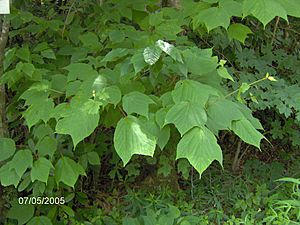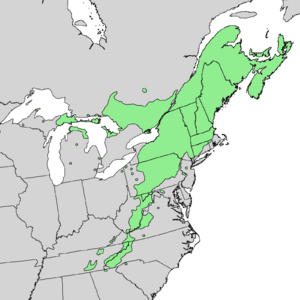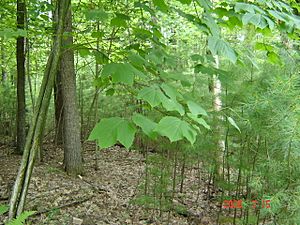Acer pensylvanicum facts for kids
Quick facts for kids Acer pensylvanicum |
|
|---|---|
 |
|
| Striped maple leaves, Cranberry Wilderness, West Virginia | |
| Conservation status | |
| Scientific classification |
|
| Kingdom: | Plantae |
| Clade: | Tracheophytes |
| Clade: | Angiosperms |
| Clade: | Eudicots |
| Clade: | Rosids |
| Order: | Sapindales |
| Family: | Sapindaceae |
| Genus: | Acer |
| Section: | A. sect. Macrantha |
| Species: |
A. pensylvanicum
|
| Binomial name | |
| Acer pensylvanicum L. 1753
|
|
 |
|
| Natural range | |
| Script error: The function "autoWithCaption" does not exist. | |
| Synonyms | |
|
|
Script error: No such module "Check for conflicting parameters".
The Acer pensylvanicum, also known as the striped maple or moosewood, is a small maple tree found in North America. It's special because it can change its sex during its life, which is called being a sequential hermaphrodite.
Contents
What is a Striped Maple?
Size and Appearance
This tree is a small deciduous tree, which means it loses its leaves in the fall. It usually grows to be about 5 to 10 meters (16 to 33 feet) tall. Its trunk can be up to 20 centimeters (8 inches) wide.
When the tree is young, its bark has cool green and white stripes. As it gets older, the bark turns brown.
Leaves and Seeds
The leaves of the striped maple are wide and soft. They are about 8 to 15 centimeters (3 to 6 inches) long and 6 to 12 centimeters (2 to 5 inches) wide. They have three shallow points that face forward.
The tree's fruit is a type of winged seed called a samara. The seeds are about 27 millimeters (1 inch) long and 11 millimeters (0.4 inches) wide. They have a wing that helps them spin and fly away from the tree.
The striped maple usually blooms, or flowers, in the late spring. The name pensylvanicum was first used by a famous scientist named Carl Linnaeus.
Where Striped Maples Grow
The striped maple naturally grows in many parts of North America. You can find it from Nova Scotia and Quebec in Canada, all the way west to southern Ontario, Michigan, and Saskatchewan.
It also grows south into the United States, reaching northeastern Ohio, Pennsylvania, and New Jersey. Along the Appalachian Mountains, it can be found as far south as northern Georgia.
How Striped Maples Live in Nature

The moosewood tree likes cool, damp forests, especially on slopes. It is an understory tree, meaning it grows beneath taller trees in the forest. It is one of the best deciduous trees at handling shade.
It can start as a small shrub and live for many years in the shade. Then, if a gap opens up in the forest canopy (like when a big tree falls), the striped maple can quickly grow taller. However, it doesn't grow tall enough to become one of the main canopy trees. Once the gap above it closes again due to other trees growing, it starts to produce lots of flowers and fruits. It can also spread by growing new plants from its roots.
Many animals like to eat the bark of the striped maple, especially in winter. This includes large mammals like moose and deer, as well as beavers and rabbits.
See also
 In Spanish: Arce de Pensilvania para niños
In Spanish: Arce de Pensilvania para niños
 | Jewel Prestage |
 | Ella Baker |
 | Fannie Lou Hamer |


